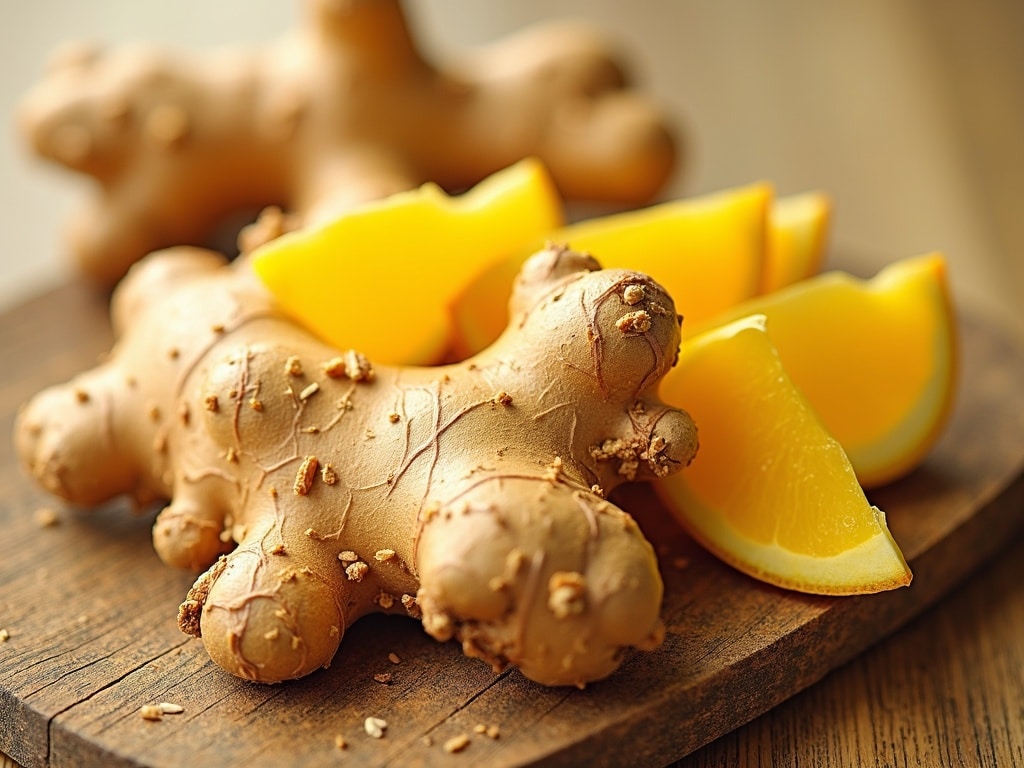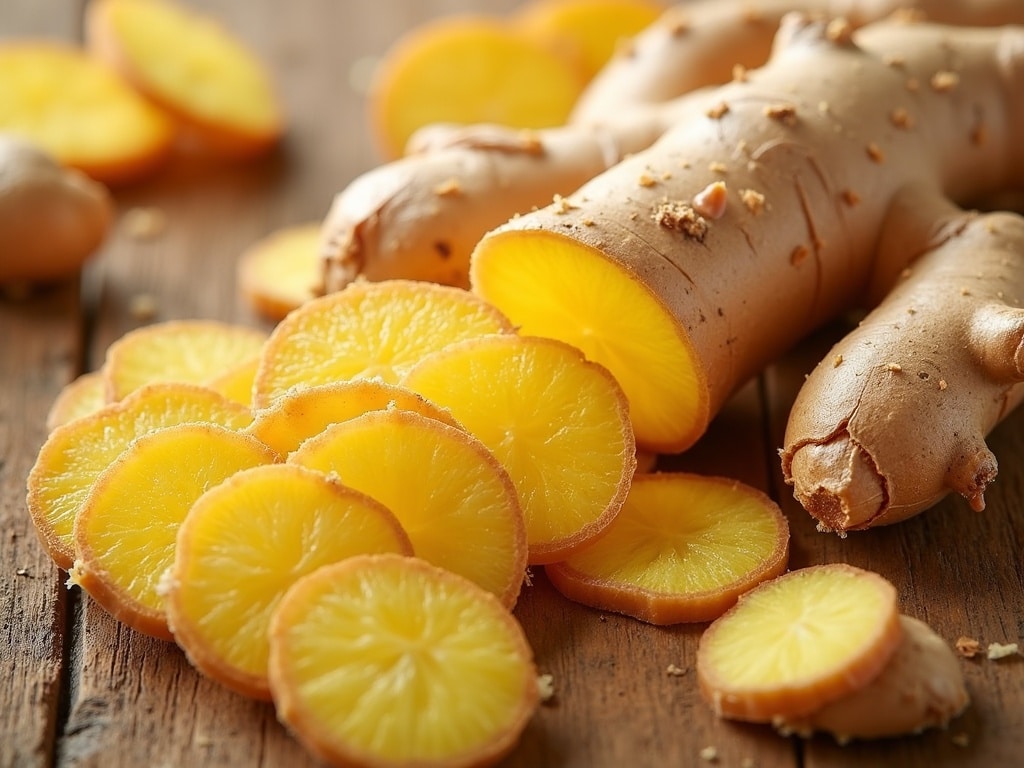Unlocking Nature's Pharmacy: Ginger for Inflammation and Pain Relief
Imagine a world where soothing relief from aches and inflammation wasn't locked away in a medicine cabinet, but readily available in your kitchen. For centuries, cultures around the globe have turned to a humble rhizome – ginger – as a potent natural remedy. But what is it about ginger that gives it such impressive anti-inflammatory and pain-relieving properties? And how can you harness its power to improve your own well-being? Let's delve into the science-backed benefits and practical applications of using ginger for inflammation and pain relief.
The Science Behind Ginger's Healing Power
Ginger (Zingiber officinale) isn't just a flavorful spice; it's a complex cocktail of bioactive compounds. The most notable of these are gingerols, shogaols, and paradols. These compounds are the workhorses behind ginger's anti-inflammatory and analgesic (pain-relieving) effects.
Key Compounds and Their Actions:
- Gingerols: Abundant in fresh ginger, gingerols are potent antioxidants and anti-inflammatory agents. They inhibit the production of inflammatory cytokines, signaling molecules that contribute to chronic inflammation.
- Shogaols: Formed when ginger is heated or dried, shogaols are even more potent than gingerols in some anti-inflammatory activities. They target different inflammatory pathways, providing a broader spectrum of relief.
- Paradols: Found in smaller amounts, paradols contribute to ginger's warming sensation and also possess antioxidant properties.
These compounds work synergistically to modulate the body's inflammatory response, reduce oxidative stress, and interfere with pain signaling pathways. But how does this translate to real-world benefits?
Proven Benefits of Ginger for Inflammation and Pain
Research has consistently demonstrated ginger's effectiveness in managing various inflammatory conditions and pain syndromes.
Osteoarthritis: A Natural Ally
Osteoarthritis, a degenerative joint disease, is a leading cause of chronic pain and disability. Studies have shown that ginger can significantly reduce pain and improve joint function in individuals with osteoarthritis. One meta-analysis published in Arthritis & Rheumatology found that ginger extract was as effective as some over-the-counter pain medications in reducing knee pain associated with osteoarthritis. Ginger works by inhibiting the production of inflammatory substances in the joints, thus alleviating pain and stiffness.
Muscle Soreness: Relief After Exercise
Delayed onset muscle soreness (DOMS), the achy feeling that often follows intense exercise, is another area where ginger shines. Research suggests that ginger can reduce muscle pain and speed up recovery after exercise. A study published in the Journal of Pain found that consuming ginger daily for several days significantly reduced muscle pain caused by eccentric exercise. Ginger's anti-inflammatory properties help to quell the inflammatory response that contributes to muscle soreness.
Menstrual Cramps: A Soothing Remedy
For many women, menstrual cramps are a painful monthly ordeal. Ginger has been shown to be an effective natural remedy for relieving menstrual pain (dysmenorrhea). Studies have compared ginger to common pain relievers like ibuprofen and found it to be equally effective in reducing pain intensity. Ginger's ability to reduce prostaglandin production, hormone-like substances that contribute to uterine contractions and pain, is believed to be the key to its effectiveness.
Inflammatory Bowel Disease (IBD): Potential Therapeutic Agent
Inflammatory bowel disease, including Crohn's disease and ulcerative colitis, is characterized by chronic inflammation of the digestive tract. While more research is needed, preliminary studies suggest that ginger may have a role to play in managing IBD symptoms. Ginger's anti-inflammatory and antioxidant properties may help to reduce inflammation in the gut and alleviate symptoms such as abdominal pain, diarrhea, and rectal bleeding. Always consult with your doctor before using ginger to treat digestive issues. They can provide personalized advice.
Other Potential Benefits:
- Migraines: Some studies suggest that ginger may help to reduce the severity and duration of migraines.
- Rheumatoid Arthritis: While more research is needed, preliminary findings indicate that ginger may help to reduce inflammation and pain associated with rheumatoid arthritis.
- Diabetes: Ginger may improve blood sugar control and reduce inflammation in people with diabetes.

How to Use Ginger for Inflammation and Pain Relief
Now that you know about the benefits, how can you incorporate ginger into your daily routine for inflammation and pain relief?
Fresh Ginger:
Fresh ginger is incredibly versatile and can be used in a variety of ways:
- Ginger Tea: Slice a few pieces of fresh ginger and steep them in hot water for 10-15 minutes. Add honey or lemon to taste.
- Smoothies: Add a small piece of fresh ginger to your favorite smoothie for a spicy kick and anti-inflammatory boost.
- Cooking: Grate or mince fresh ginger and add it to stir-fries, soups, sauces, and marinades.
Ginger Powder:
Ginger powder is a convenient option for adding ginger to your diet. It can be easily added to:
- Capsules: Make your own ginger capsules.
- Baked Goods: Sprinkle it into cookies, cakes, and muffins.
- Sprinkled: Add to curries, soups, or stews.
Ginger Supplements:
Ginger supplements are available in capsule, tablet, and liquid extract form. These can provide a concentrated dose of ginger's active compounds. When choosing a supplement, look for products that are standardized to contain a certain percentage of gingerols.
Topical Ginger:
Ginger-infused creams and oils can be applied directly to sore muscles or joints for localized pain relief. Look for products that contain a high concentration of ginger extract.
Dosage and Safety Considerations
While ginger is generally considered safe, it's important to be aware of potential side effects and drug interactions.
Recommended Dosage:
The optimal dosage of ginger varies depending on the form and the condition being treated. However, a general guideline is:
- Fresh Ginger: 1-3 grams per day.
- Ginger Powder: 0.5-1 gram per day.
- Ginger Extract: 250-500 mg, 2-3 times per day.
Potential Side Effects:
In rare cases, ginger may cause mild side effects such as:
- Heartburn
- Diarrhea
- Stomach upset
Drug Interactions:
Ginger may interact with certain medications, including:
- Blood thinners: Ginger can increase the risk of bleeding, especially in people taking blood thinners like warfarin.
- Diabetes medications: Ginger may lower blood sugar levels, potentially leading to hypoglycemia in people taking diabetes medications.
- Blood pressure medications: Ginger may lower blood pressure, potentially causing hypotension in people taking blood pressure medications.
Important: It's always best to talk to your doctor before taking ginger supplements, especially if you have any underlying health conditions or are taking any medications. Pregnant and breastfeeding women should also consult with their doctor before using ginger.
Beyond Ginger: Complementary Strategies for Inflammation and Pain Relief
While ginger is a powerful tool, it's most effective when combined with other healthy lifestyle choices.
Anti-Inflammatory Diet:
Focus on eating a diet rich in fruits, vegetables, whole grains, and healthy fats. Limit processed foods, sugary drinks, and red meat, as these can contribute to inflammation.
Regular Exercise:
Exercise helps to reduce inflammation and improve overall health. Aim for at least 30 minutes of moderate-intensity exercise most days of the week.
Stress Management:
Chronic stress can exacerbate inflammation. Practice stress-reducing techniques such as yoga, meditation, or deep breathing exercises.
Sufficient Sleep:
Getting enough sleep is crucial for reducing inflammation and promoting healing. Aim for 7-8 hours of sleep per night.
The Bottom Line: Embrace the Natural Power of Ginger
Ginger offers a compelling natural approach to managing inflammation and pain. From soothing achy joints to easing muscle soreness, this potent rhizome has a wide range of scientifically supported benefits. By incorporating ginger into your diet and lifestyle, and consulting with your doctor, you can unlock nature's pharmacy and experience the healing power of this remarkable spice. So go ahead, brew a cup of ginger tea, add a slice to your smoothie, and discover the remarkable potential of ginger for a healthier, pain-free life.

